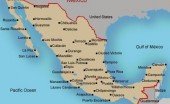Molly Minturn - My family is heartbroken to share that my father died in surgery on Monday, Feb. 10. It…
Wednesday Night #1382
Written by Diana Thebaud Nicholson // August 27, 2008 // Cleo Paskal, People Meta, Reports, Wednesday Nights // 2 Comments
Following last Wednesday Night’s Canada-focused (healthcare, the NDP and environment) evening, we are looking forward to reviewing matters beyond our borders in the company of Carole and Rodrigue Tremblay. Dr. Tremblay, an economist, is a former Quebec Minister of Industry and Commerce, and has published 27 books, most of them dealing with finance and economics while others focus on moral and political issues. He is a prolific author of articles, the most recent “Why Not Simply Abolish NATO?”
Carole is an author in her own right, principally of children’s books. We very much enjoyed her novel, Cybercash about an American President who abolished cash as a means of consolidating his power – a great read!
In their company we look forward to reviewing some of the latest world events, including the Democratic National Convention (Joe Biden will be delivering his acceptance speech); the aftermath of the Beijing Olympics; the latest developments in the Russia/Georgia conflict – and more important, Russia’s long-term strategy to reassert dominion over the former Soviet states – ; Pakistan; the impending federal election and, of course, the state of the U.S. and world economy. On the latter topic, John Mauldin’s “Dead Men Walking” blog may stimulate some reactions.
Olivier d’Auriol is with us from Lausanne and will bring his most welcome world view of the economy and geopolitical developments, all from the perspective of the Fund of Funds of Funds.
Eric Hamovitch will be attending The Montreal Economic Institute luncheon on the topic of bulk water exports. Rumor has it that the MEI will be releasing a report in favour. We can count on him to report faithfully on the discussion and bring any available material.
Should we run out of topics, one issue that begs to be addressed is the Harper government’s reduction of spending on the arts. We would call your attention to Keith Spicer’s excellent piece in the Ottawa Citizen: “The Tories as Internationalists.
The Report
Cleo Paskal was awarded the OWN and was appointed Honoured Companion, Fellow and Roving Correspondent
In recognition of [her] persistent efforts from wherever in the world [she] happen[s] to be to educate and inform Wednesday Night on a vast range of matters including those related to the Arctic, Environment, India, Security, and Small Island States, [her] intelligent and thought-provoking in-person or electronic interventions on numerous topics, and [her] unflagging dedication to widening the circle of Wednesday Night experts through the introduction of worthy guests and contributors
In Cleo’s absence, her husband, Jens Christian Justinussen accepted the award on her behalf (much later, Cleo arrived and the ceremony was repeated).
Economics, sport, environment, the Responsibility to protect … wide-ranging topics, all united by a common theme underlined by Dr. Rodrigue Tremblay’s forthcoming book, The Code for Global Ethics: Toward a humanist civilization , and the role of the people and governments in fostering a humanistic, just, equitable society, with a strong moral foundation.
Anti-doping
The earlier skepticism regarding the ability of the Beijing Olympics to be free from drug scandals continues. So far, the most prominent athletes were the four horses that were disqualified . It remains that WADA simply does not have the funding to conduct all necessary anti-doping tests and inevitably some athletes will slip through the net.
The Economy
The dollar and the euro
The Europeans, led by Europe’s central bankers, notably the French and the Germans, are attempting to distance themselves from the U.S. dollar, by keeping interest rates high, trying to avoid the inflationary trend that has been evident in the U.S. If oil prices stay where they are, inflation will come down, however forecasting oil prices has become impossible.
Banks
A number of Wednesday Nighters have been negative about banks for some time. The fall of UBS from its pedestal as provoked a gloom in the city of Zurich which seems to reflect the citizens’ shock and outrage that a symbol of Swiss banking probity should be outed as an ‘American-style bank’. The problem however, was due more to the absence of expertise in the banks when confronted by the complex sub-prime classification as Triple-A. There is another development which could hurt the Swiss banking industry even more: the threat that European governments may soon require the divulging of the same information about the banks’ clients as the IRS can ask for regarding American clients. Given that some 85% of Swiss banking comes from evasion fiscale of European clients, such a move could bring about the end of Swiss banking as we know it.
Long-term outlook
(RT) over the next 20 years we will have to invent a new world. From elementary schools in Quebec through prestigious universities, courses are being offered on ethics or the equivalent of ‘western civilization’ to inform students about great philosophies and values religious and social beliefs and practices. Therefore the new book on ethics and morality.
Stock market
Things will remain pretty difficult for a while. If I were an equities investor I would look at bonds, not stocks. Credit markets are under strain, will likely remain so for some time, and historically stocks do not do well in such periods.
Hedge fund managers are having to adapt. Banks are selling securities linked to fixed income, linked to cash flow; hedge funds are acquiring these highly undervalued securities which should bring gains over the next year. This long-term strategy is not always understood by the investors and some hedge funds have suffered huge losses from redemptions – underlining the need for investors to diversify. As many institutional investors, pension fund committees, etc., are not experienced in dealing with a number of hedge funds, they often have misconceptions about their objectives. This past year has demonstrated that for many of those investors what they thought were alternative investments that were supposed to provide downside protection, in fact were leveraged.
Responsibility to protect
Although the convention at which states will meet to define the crime of aggression (the crime of starting a war) will not take place until 2010, Georgia is bringing suit against Russia, alleging illegal use of force in the International Court of Justice (a relatively new institution, dating only from 2002), the first part of which is to be heard on September 8. It is problematic in that the crime of aggression has not yet been defined.
Russia has seized the offensive in the International Criminal Court claiming that Georgia was guilty of genocide in South Ossetia. This would come under the already defined crimes against humanity which include systematic mistreatment of a population, or portion of a population, including genocide (Darfur) – and may in the future be defined very broadly to include such acts as drug trafficking and environmental degradation.
As can be seen in this current example, the international justice issues are becoming part of a state’s strategic arsenal.
The problem is that while the Great Powers (e.g. U.S., China) are supportive of the notion of the Responsibility to protect, they are also wary that it could be used against them. As of now, the Permanent Five of the Security Council can stop any case that has been started in the ICC, provided that they agree unanimously – a reverse veto exists. Another wrinkle is that an individual, or group of individuals captured in the act of committing aggression within the territory of a country that is a signatory to the statute can be brought to prosecution.
Water
The Montreal Economic Institute, a think tank based on seeking free-market solutions to economic problems, is advocating bulk water for export, arguing that, without draining lakes and river, exporting 10% of our water at a price determined by the cost of desalination could be a source of enormous wealth for Quebec. One objection raised was that farmers in south-western U.S. receive enormous subsidies bringing their cost of water down to 5-7 cents; if Quebec were to export water at 65 cents, where would the market be?
[A strong argument against the MEI proposal was presented in the Gazette by Karel Mayrand, the new Quebec Director General of the David Suzuki Foundation, Exporting bulk water is the wrong way to go ]
There is a similar debate in the state of Maine over the exploitation of Poland Spring water. We could see the same kind of debate in Canada over perceived depletion of a natural resource.
The debate is likely to continue as the question has major political ramifications, along with economic. However, there may soon be technological solutions that make bulk shipment uneconomic, given that water is extremely dense and therefore costly to ship.
Alternative sources of energy
The debate amongst our proponents of various technologies continues. Can a new electrolysis accelerator solve the back-up problems by storing the energy generated as hydrogen for wind energy?
The question remains why alternative energy proponents insist that one form is vastly superior to another. Surely, just as diversification of investments is desirable in money management, the principle applies to sources of energy? Furthermore, leaving aside the engineering costs associated with the development of any source of energy – fossil fuel or other options – we have yet to determine the price of the externalities (e.g. storage of spent fuel rods) and environmental consequences that we as a society are prepared to pay. In other words, this is not an economic, but a social, moral and ethical one.




2 Comments on "Wednesday Night #1382"
From our favorite economist:
A simple way to tell this story is to say that many billions in assets people thought existed turned out not to exist. It takes time to sort out and to discover who lost how much.(Contrast this with a war, where assets are also destroyed. In the latter case, it is painfully obvious whose house was leveled.)
One interesting (??) show is how GM is trying to reinvent itself as an Overseas automobile company. Ford is not doing anything obvious to save itself. Chrysler is owned and run by a hedge fund. The losers in the US are primarily the shareholders of banks, as it should be. The ABCP story in Canada is an attempt to shift the burden of the bank shareholders to the folks who happened to hold the paper on Aug.13 2007. That is the real story behind Purdy Crawford et.al. In the US a similar attempt was very recently foiled by the regulators.
Postscript on the ICC
French official offers Sudan a deal to settle ICC row
September 4, 2008 (KHARTOUM) – The French government presented to Sudan a plan that may lead to blocking investigations by the International Criminal Court (ICC), according to a news report.
The daily Al-Hayat newspaper published in London said that the French Presidential Advisor for African Affairs Bruno Joubert promised to support a deferral of ICC prosecutions through a UN Security Council (UNSC) resolution.
In return for that Sudan would prosecute two suspects wanted by the ICC including Ahmed Haroun, state minister for humanitarian affairs and militia commander Ali Mohamed Ali Abdel-Rahman, also know as Ali Kushayb.
Distressing news! David